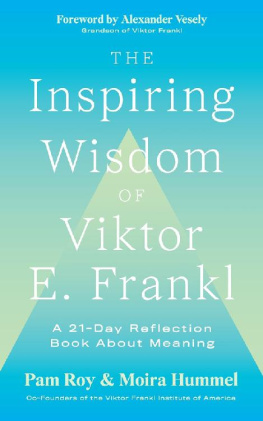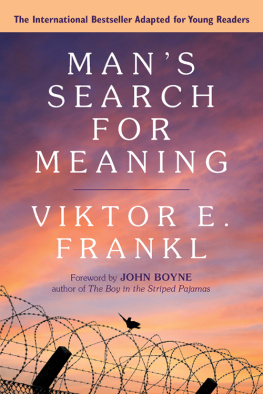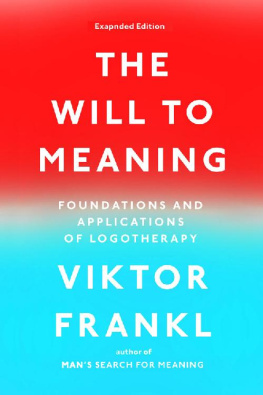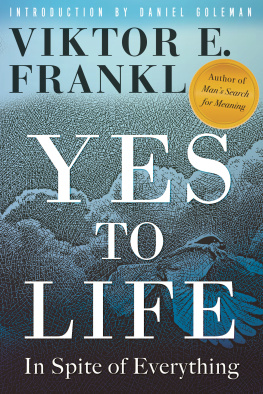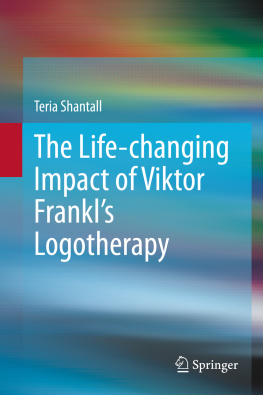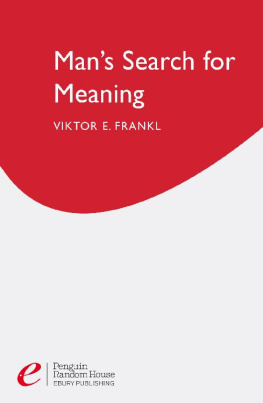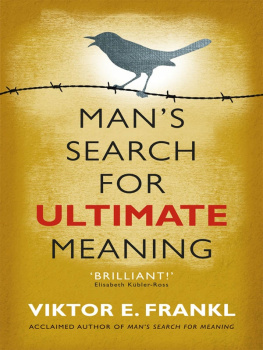Pam Roy - The Inspiring Wisdom of Viktor E. Frankl
Here you can read online Pam Roy - The Inspiring Wisdom of Viktor E. Frankl full text of the book (entire story) in english for free. Download pdf and epub, get meaning, cover and reviews about this ebook. year: 2020, publisher: Viktor Frankl Institute of America, genre: Home and family. Description of the work, (preface) as well as reviews are available. Best literature library LitArk.com created for fans of good reading and offers a wide selection of genres:
Romance novel
Science fiction
Adventure
Detective
Science
History
Home and family
Prose
Art
Politics
Computer
Non-fiction
Religion
Business
Children
Humor
Choose a favorite category and find really read worthwhile books. Enjoy immersion in the world of imagination, feel the emotions of the characters or learn something new for yourself, make an fascinating discovery.
- Book:The Inspiring Wisdom of Viktor E. Frankl
- Author:
- Publisher:Viktor Frankl Institute of America
- Genre:
- Year:2020
- Rating:5 / 5
- Favourites:Add to favourites
- Your mark:
- 100
- 1
- 2
- 3
- 4
- 5
The Inspiring Wisdom of Viktor E. Frankl: summary, description and annotation
We offer to read an annotation, description, summary or preface (depends on what the author of the book "The Inspiring Wisdom of Viktor E. Frankl" wrote himself). If you haven't found the necessary information about the book — write in the comments, we will try to find it.
Pam Roy: author's other books
Who wrote The Inspiring Wisdom of Viktor E. Frankl? Find out the surname, the name of the author of the book and a list of all author's works by series.
The Inspiring Wisdom of Viktor E. Frankl — read online for free the complete book (whole text) full work
Below is the text of the book, divided by pages. System saving the place of the last page read, allows you to conveniently read the book "The Inspiring Wisdom of Viktor E. Frankl" online for free, without having to search again every time where you left off. Put a bookmark, and you can go to the page where you finished reading at any time.
Font size:
Interval:
Bookmark:


VFIA Publishing
Los Angeles, CA
Copyright 2020 by VFIA Publishing. All rights reserved.
Excerpt(s) from Mans Search for Meaning by Viktor E. Frankl.
Copyright 1959, 1962, 1984, 1992 by Viktor E. Frankl.
Reprinted with permission from Beacon Press, Boston, Massachusetts
Excerpt(s) from The Will to Meaning: The Foundations and Applications of Logotherapy by Viktor E. Frankl, copyright 1969, 1988 by Viktor E. Frankl. Used by permission of New American Library, an imprint of Penguin Publishing Group, a division of Penguin Random House LLC. All rights reserved.
Excerpt(s) from The Doctor and the Soul: From Psychotherapy to Logotherapy by Viktor E. Frankl, M.D., Ph.D., translated by Richard and Clara Winston, copyright 1955, 1965 by Penguin Random House LLC. Used by permission of Alfred A. Knopf, an imprint of the Knopf Doubleday Publishing Group, a division of Penguin Random House LLC. All rights reserved.
Excerpt(s) from Mans Search For Ultimate Meaning by Viktor Frankl, copyright 2000, 1997. Reprinted by permission of Basic Books, an imprint of Hachette Book Group, Inc.
Excerpt(s) from Recollections: An Autobiography by Viktor Frankl, copyright 2000. Reprinted by permission of Basic Books, an imprint of Hachette Book Group, Inc.
Cataloging-in-Publication Data is on file with the Library of Congress
Paperback ISBN: 978-1-7348862-0-7
e-book ISBN: 978-1-7348862-1-4
Interior design by Amy Hayes Design
Editorial and self-publishing guidance by knliterary.com
ViktorFranklAmerica.com
Printed in the United States of America
From Pam
For my daughters, Emily, Rachel, and Allison, and youth everywhere yearning to discover meaning in their lives.
From Moira
For Brian, Becky, Joe, Tori, Jessica, Noah, Kathy, and my parents with many thanks for your love and support.
CONTENTS
by Alexander Vesely, Grandson of Viktor Frankl
FOREWORD
Many people are familiar with the name of my grandfather, Viktor Frankl, but few know much about his message. He is often recalled as a Holocaust survivor, but in reality, that experience played a small role in his overall lifes work. His greatest contribution to humanity was recognizing meaning as a central factor in mental health.
My grandfathers interest in psychology started at an early age. He enrolled in adult night classes when he was in junior high school. His first article was published when he was eighteen, and by the time he was twenty-two, he was lecturing on the meaning of life. In 1930, at the age of twenty-five, he organized youth counseling centers in Vienna, successfully combatting the epidemic of teen suicides that would occur around the time report cards were issued. Within a year, suicides dropped to zero. By the time he completed medical school, he had developed a specialty in psychiatry and neurology with a focus on treating suicidal patients.
His views about meaning brought him into conflict with Sigmund Freud and Alfred Adler, the founders of modern psychotherapy. As a teenager, he corresponded with Freud, and then joined Adlers school for a time. While my grandfather acknowledged the importance of their work, he went on to establish his own theory, which is often referred to as the third Viennese school of psychotherapy. He named the theory Logotherapy, from the Greek for healing through meaning.
Years before World War II, he treated thousands of suicidal patients at psychiatric hospitals and developed the core principles of Logotherapy. The completed manuscript of his first book about it was confiscated when he was sent to Auschwitz. He was thirty-seven years old at the time. His encounters with the worst of human conditions ended up providing him with an unwanted laboratory that confirmed his theory. He saw that those who were oriented toward a meaning to be fulfilled were more likely to survive.
After the war, he taught throughout the United States and held professorships at Harvard, Stanford, Southern Methodist University, and Duquesne University in Pittsburgh. The English translation of his book Mans Search for Meaning was published in 1959 and became an international bestseller. My grandfather saw this not so much as a personal achievement, but as a symptom of the mass neurosis of modern time since its title promised to deal with the question of lifes meaningfulness. Decades later, the book still shows up consistently on Amazons top 100 books.
Logotherapy as a psychological practice is hard to standardize, package, and market, so it has not gained as much traction in the United States as it has in other parts of the world. It recognizes that every person is unique and cannot fit into a standardized theory. Requiring creativity and flexibility, therapy at its best is as much an art as a science. He liked to refer to American neurologist George M. Beard, who noted that if two cases of neuroses were treated the same way, at least one was treated improperly.
I was lucky enough to grow up knowing my grandfather both personally and professionally. He encouraged my love of filmmaking when I was a teenager and also supported my decision to become a Logotherapist when I was an adult. I have had the privilege to archive innumerable videos and interviews of him throughout his life. These are constant reminders of his timeless wisdom and his wonderful sense of humoranother quality he believed to be a resource of healing and well-being.
I met Pam and Moira while we were working together on a film project. Friends for over forty years, they were inspired to write this thought-provoking book about meaning because of their concern for Americas youth and the growing epidemic of mental illness. They recognize the importance of my grandfathers philosophy of life and have used it to guide their own lives and raise their children. Just as he did, they see the bigger picture, the underlying problems, and the systemic issues that need to be addressed. My grandfather would be pleased that they are introducing his ideas to a new generation of readers.
Alexander Vesely
INTRODUCTION
People may have enough to live by;
but more often than not they do not have anything to live for.
As human beings, we are motivated to find meaning. However, meaning is unique to each person. It cannot be created or given to usit must be discovered. Our search for meaning is a personal journey that each of us must take. This book facilitates that journey. Through inspiring quotes from Viktor Frankl and accompanying exercises for self-discovery, it offers twenty-one reflections on topics such as purpose, freedom, and self-transcendence. These reflections can be contemplated over twenty-one days or twenty-one years. They can be done in any order and revisited at any time. They simply create space for you to become more aware of who you are and how you fit into the world. Life has meaning under all circumstances, including the most undesirable. Even if our only source of meaning is our attitude toward an unavoidable situation, we have the freedom and responsibility to answer the demands life presents to us. No matter where you are in your life, this book facilitates the search for meaning, which is our primary motivation for living.
The life and work of Viktor E. Frankl (19051997) inspired this book. From the time he was a young boy, Frankl believed that meaning was central to life.
As a neurologist and psychiatrist, he studied it. As a philosopher, he sought to understand it. As a survivor of concentration camps during the Holocaust, he lived it. Frankls life journey showed him that he who has a
Next pageFont size:
Interval:
Bookmark:
Similar books «The Inspiring Wisdom of Viktor E. Frankl»
Look at similar books to The Inspiring Wisdom of Viktor E. Frankl. We have selected literature similar in name and meaning in the hope of providing readers with more options to find new, interesting, not yet read works.
Discussion, reviews of the book The Inspiring Wisdom of Viktor E. Frankl and just readers' own opinions. Leave your comments, write what you think about the work, its meaning or the main characters. Specify what exactly you liked and what you didn't like, and why you think so.

